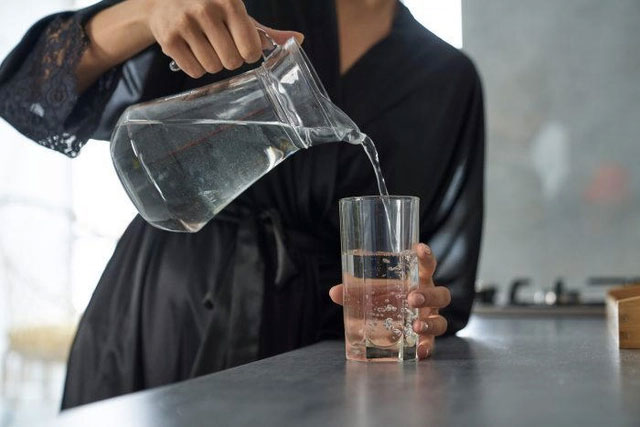Health organizations always advise us that staying hydrated is crucial for the body to function properly. However, it’s important to drink just enough, not too much.
Physical Signs of Overhydration
- You experience persistent headaches
- You lose the urge to urinate
- You drink water even when you’re not thirsty
- Your urine looks like water
- You urinate frequently, even at night
- You experience “leakage incidents” due to excessive water intake
- You feel nauseous or experience vomiting or diarrhea
- Swelling or discoloration in your hands, lips, and feet
- Your muscles are weak and prone to cramping
- You feel fatigued
Austin DeRosa, a urologist at the UCHealth Cancer Center in Highlands Ranch, Colorado, and head of the Robotic Surgery Department at the University of Colorado Medical School, states: Drinking too much water usually doesn’t lead to worse consequences than frequent urination—but in certain cases, it can cause serious illness and even death. Hyponatremia, sometimes referred to as “water intoxication”, causes abnormally low sodium and other electrolyte levels in your blood, which can lead to severe health issues such as seizures, coma, and in rare cases, death, he explains.
The good news is that there can be several signs indicating that you are drinking too much water. Let’s check them out!

Drinking too much water can sometimes lead to serious illness and even death.
Never leave home without a water bottle and constantly hold one in your hand – a psychological sign of overhydration If you carry your water bottle all day and refill it as soon as it starts to get low, you might be drinking too much water. Continuously replenishing your body with water can lead to low sodium levels in the blood, according to the Mayo Clinic, causing your cells to swell. According to Tamara Hew-Butler, Ph.D., a professor of exercise science at Oakland University in Rochester, Michigan, this can become especially dangerous when your brain begins to swell. Hew-Butler states: “Your brain can only swell about 8 to 10% before it hits the skull and pushes your brainstem out.” |
You Experience Persistent Headaches
Headaches can be a sign of either overhydration or dehydration. When you drink too much water, the salt concentration in your blood decreases, causing cells in various organs throughout your body to swell.
Again, this can affect the brain. When your salt levels are low, your cells will expand. Think of it this way: When you drink too much water, your brain actually swells and presses against the skull. This added pressure can cause sharp headaches and more severe health issues, such as cognitive decline and shortness of breath.
You Lose the Urge to Urinate
Controlling urination is a learned skill, which is why we “potty train” children when they are young. However, if you constantly fill your bladder due to excessive drinking or hold your urine for too long, you may “lose” that skill, Dr. DeRosa says. This makes it difficult to recognize when you need to urinate or may even cause you to feel the urge to urinate even when you don’t need to.
You Drink Water Even When You’re Not Thirsty
The best way to know if your body truly needs more water is to see if you actually feel thirsty. Hew-Butler states: “Our bodies are programmed to resist dehydration. Thirst is each body’s personal monitor to let them know if they need more.”
In agreement, Dr. Caudle suggests that it’s important to learn to pay more attention to your body’s signals—including hunger, fatigue, and thirst.
Your Urine Looks Like Water
If you are drinking a healthy amount of water, your urine should range from straw yellow to clear yellow. Clear urine is a clear sign that you are drinking too much water.
The general rule is to drink 8 to 10 cups of water a day. However, according to Dr. Caudle, the amount of water you need really depends on your height, weight, age, activity level, health status, and weather. Once again, the key is to learn to recognize your body’s thirst cues.
You Urinate Frequently, Even at Night
Using clinical terminology for urination, Dr. DeRosa states, “On average, a person will urinate 6 to 10 times a day, so if you find yourself urinating more than 10 times a day, you may be drinking more water than your body needs. Waking up more than once at night to urinate is another sign of overhydration.”
There are many other potential causes for frequent urination, including overactive bladder or too much caffeine. So, if your water intake is within normal limits but you are still urinating every hour, it may be time to talk to your doctor.
You Experience “Leakage Incidents” Due to Excessive Water Intake
The average bladder can hold 20 to 30 ounces of fluid before needing to empty—however, Dr. DeRosa says, just because you can stretch your bladder to the size of a grapefruit doesn’t mean you should.
Many people who have too much urine in their bladder try to “hold it” for longer, which can lead to bladder leakage. (If you have to urinate more frequently than every two hours or wake up more than once to urinate at night, your bladder may be overactive).
You Feel Nauseous or Experience Vomiting or Diarrhea
Hew-Butler explains that the symptoms of overhydration closely resemble those of dehydration. When you drink too much water, your kidneys cannot eliminate the excess fluid. This leads to water retention in your body, causing several uncomfortable symptoms, often including nausea, vomiting, and diarrhea.
Swelling or Discoloration in Your Hands, Lips, and Feet
Dr. Caudle states: “In many cases of hyponatremia, people will experience significant swelling or discoloration in their hands, lips, and feet. When all the cells throughout the body swell, your skin will also begin to visibly swell.” (Even in less severe cases, drinking water can lead to swelling or bloating).
People who drink too much water may experience sudden weight gain due to swelling and excess water in the blood. If you are drinking more than 10 cups of water a day and notice swelling or discoloration in your hands, lips, and feet, consider cutting back on your water intake and see if your symptoms improve.

Drinking too much water can lead to sudden weight gain due to swelling and excess water in the blood.
Your Muscles Are Weak and Prone to Cramping
When you drink too much water, your electrolyte levels decrease, and your body’s balance is disrupted. Low electrolyte levels can cause several uncomfortable symptoms, including muscle spasms and cramps.
You can prevent muscle issues by replacing a few cups of water each day with coconut water, a drink rich in electrolytes and 100% natural, or an electrolyte beverage.
You Feel Fatigued
The kidneys are responsible for filtering the water you drink through your body and ensuring your blood fluid levels are balanced. When you drink too much water, your kidneys have to work harder, creating a stress response from hormones that makes your body feel stressed and fatigued. If you find yourself continuously drinking water and having difficulty getting out of bed, it may be due to the unnecessary stress you are placing on your kidneys.


















































